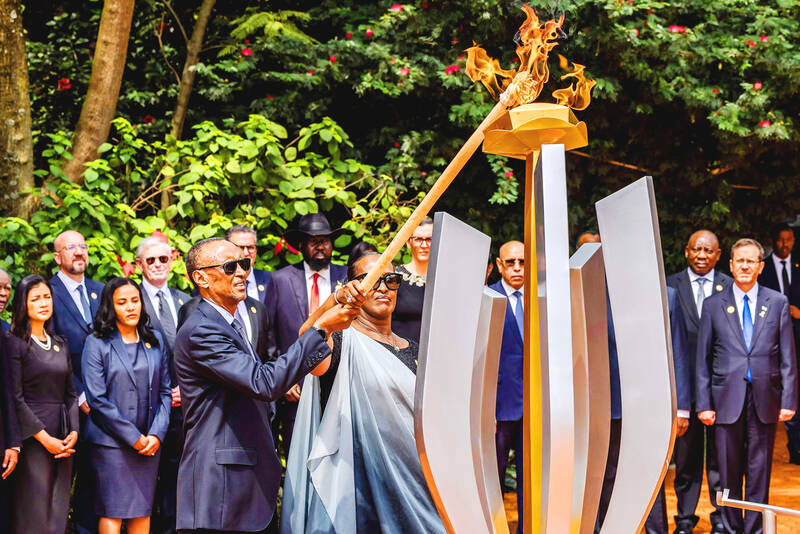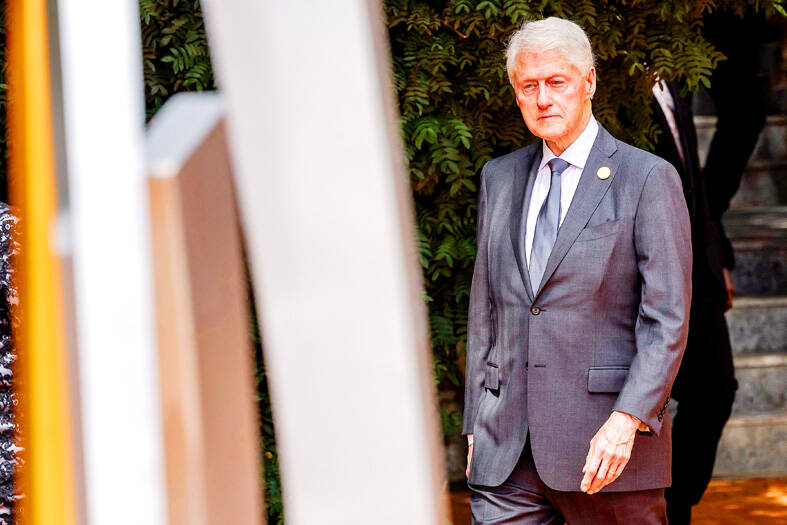Rwanda yesterday paid solemn tribute to genocide victims, 30 years after a vicious campaign orchestrated by Hutu extremists tore apart the country, as neighbors turned on each other in one of the bloodiest massacres of the 20th century.
The killing spree, which lasted 100 days before the Rwandan Patriotic Front (RPF) rebel militia took Kigali in July 1994, claimed the lives of 800,000 people, largely Tutsis, but also moderate Hutus.
The tiny nation has since found its footing under Rwandan President Paul Kagame, who led the RPF, but the scars of the violence remain, leaving a trail of destruction across the African Great Lakes region.

Photo: AFP
In keeping with tradition, the ceremonies on April 7 — the day Hutu militias unleashed the carnage in 1994 — began with Kagame lighting a remembrance flame at the Kigali Genocide Memorial, where more than 250,000 victims are believed to be buried.
As an army band played mournful melodies, Kagame placed wreaths on the mass graves, flanked by foreign dignitaries including several African heads of state and former US president Bill Clinton, who had called the genocide the biggest failure of his administration.
The international community’s failure to intervene has been a cause of lingering shame.

Photo: AFP
French President Emmanuel Macron was yesterday expected to release a message saying that France and its Western and African allies “could have stopped” the bloodshed, but lacked the will to do so.
Kagame was to give a speech at a 10,000-seat arena in the capital, where Rwandans were later to hold a candlelight vigil for those killed in the slaughter.
Yesterday’s events marked the start of a week of national mourning, with Rwanda effectively coming to a standstill and national flags flown at half-mast.
Music would not be allowed in public places or on the radio, while sports events and movies are banned from TV broadcasts, unless connected to what has been dubbed “Kwibuka 30.” Kwibuka means “to remember.”
The UN and the African Union are also to hold remembrance ceremonies.
Karel Kovanda, a former Czech diplomat who was the first UN ambassador to publicly call the events of 1994 a genocide, nearly a month after the killings began, said the massacres should never be forgotten.
“The page cannot be turned,” he said in an interview in Kigali, urging efforts to ensure that “the genocide [does not] slip into oblivion.”
The assassination of Hutu president Juvenal Habyarimana on the night of April 6, when his plane was shot down over Kigali, triggered the rampage by Hutu extremists and the Interahamwe militia.
Their victims were shot, beaten or hacked to death in killings fueled by vicious anti-Tutsi propaganda broadcast on TV and radio. At least 250,000 women were raped, according to UN figures.
Each year new mass graves are uncovered around the country.
In 2002, Rwanda set up community tribunals where victims heard “confessions” from those who had persecuted them, although rights watchdogs said the system also resulted in miscarriages of justice.

Kehinde Sanni spends his days smoothing out dents and repainting scratched bumpers in a modest autobody shop in Lagos. He has never left Nigeria, yet he speaks glowingly of Burkina Faso military leader Ibrahim Traore. “Nigeria needs someone like Ibrahim Traore of Burkina Faso. He is doing well for his country,” Sanni said. His admiration is shaped by a steady stream of viral videos, memes and social media posts — many misleading or outright false — portraying Traore as a fearless reformer who defied Western powers and reclaimed his country’s dignity. The Burkinabe strongman swept into power following a coup in September 2022

TRUMP EFFECT: The win capped one of the most dramatic turnarounds in Canadian political history after the Conservatives had led the Liberals by more than 20 points Canadian Prime Minister Mark Carney yesterday pledged to win US President Donald Trump’s trade war after winning Canada’s election and leading his Liberal Party to another term in power. Following a campaign dominated by Trump’s tariffs and annexation threats, Carney promised to chart “a new path forward” in a world “fundamentally changed” by a US that is newly hostile to free trade. “We are over the shock of the American betrayal, but we should never forget the lessons,” said Carney, who led the central banks of Canada and the UK before entering politics earlier this year. “We will win this trade war and

‘FRAGMENTING’: British politics have for a long time been dominated by the Labor Party and the Tories, but polls suggest that Reform now poses a significant challenge Hard-right upstarts Reform UK snatched a parliamentary seat from British Prime Minister Keir Starmer’s Labor Party yesterday in local elections that dealt a blow to the UK’s two establishment parties. Reform, led by anti-immigrant firebrand Nigel Farage, won the by-election in Runcorn and Helsby in northwest England by just six votes, as it picked up gains in other localities, including one mayoralty. The group’s strong showing continues momentum it built up at last year’s general election and appears to confirm a trend that the UK is entering an era of multi-party politics. “For the movement, for the party it’s a very, very big

‘BODIES EVERYWHERE’: The incident occurred at a Filipino festival celebrating an anti-colonial leader, with the driver described as a ‘lone suspect’ known to police Canadian police arrested a man on Saturday after a car plowed into a street party in the western Canadian city of Vancouver, killing a number of people. Authorities said the incident happened shortly after 8pm in Vancouver’s Sunset on Fraser neighborhood as members of the Filipino community gathered to celebrate Lapu Lapu Day. The festival, which commemorates a Filipino anti-colonial leader from the 16th century, falls this year on the weekend before Canada’s election. A 30-year-old local man was arrested at the scene, Vancouver police wrote on X. The driver was a “lone suspect” known to police, a police spokesperson told journalists at the